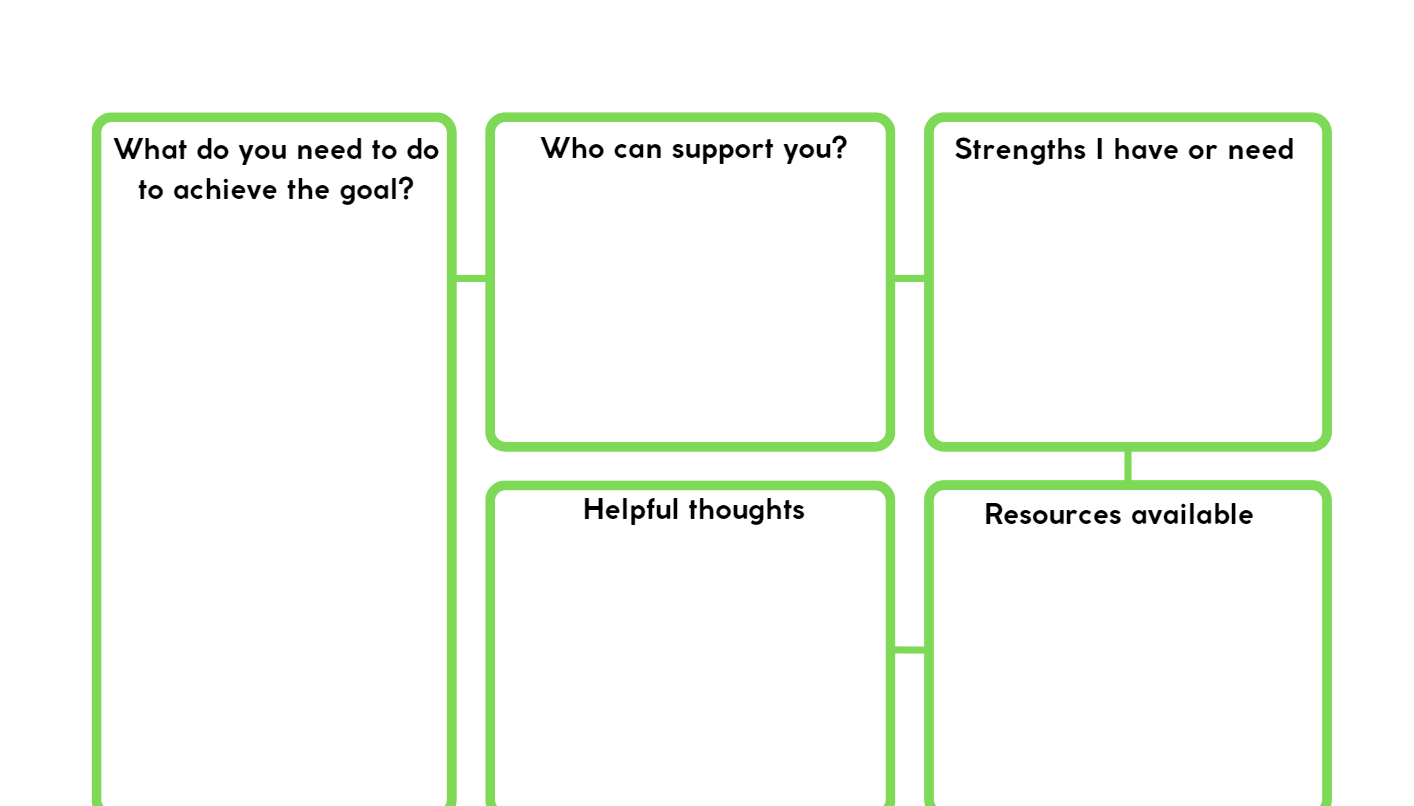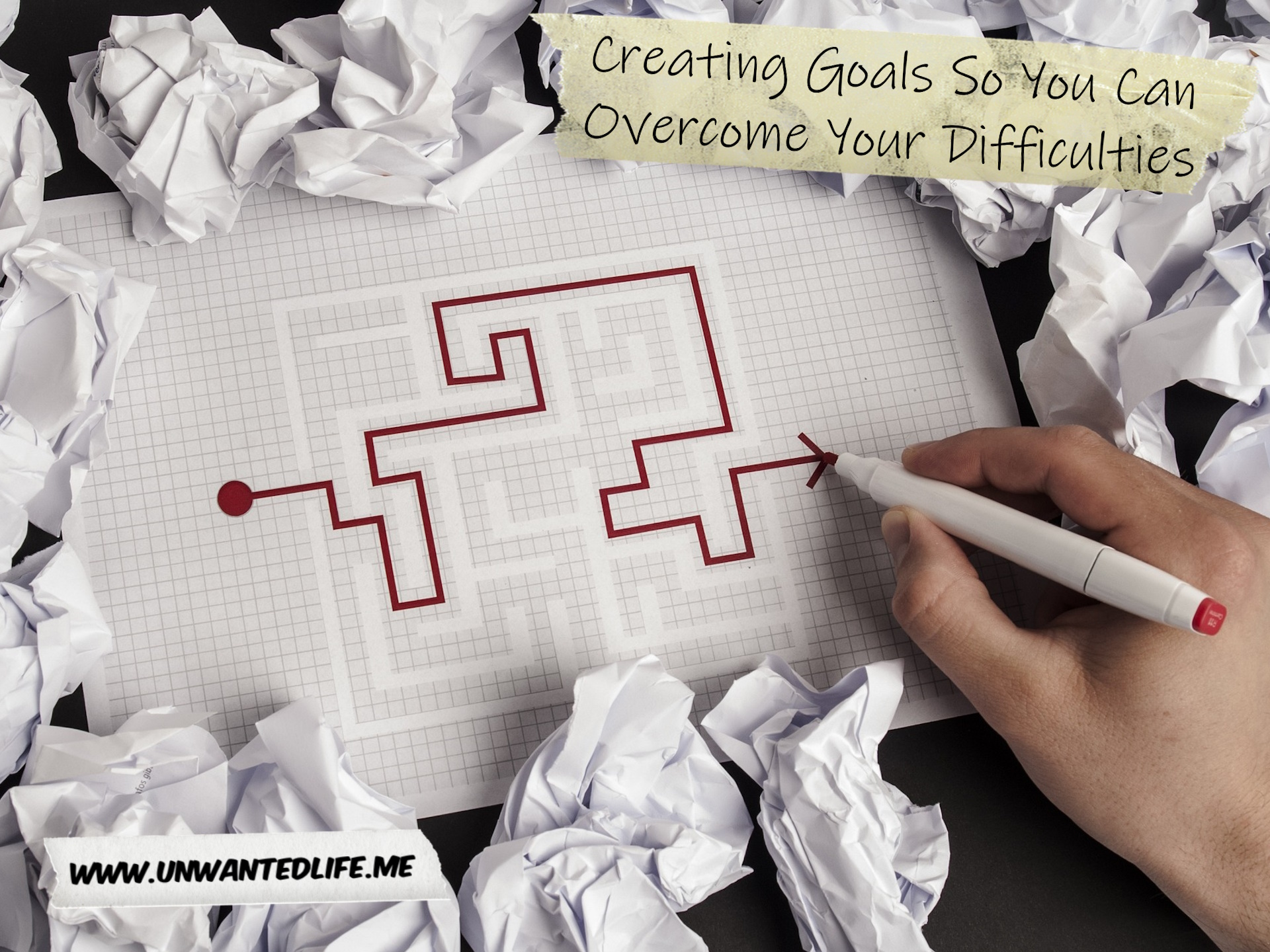If you’ve been a long-time reader of Unwanted Life, then you might be familiar with my SMART goals article. SMART goals are great, but they often aren’t where you’ll start your goal-creating process. Therefore, I’ve put together this simple guide to creating goals that’ll help you smash your recovery goals or aid with your life goals.
What’s So Important About Creating Goals?
As with life, in recovery, it helps to have goals to work towards. When it comes to goals in our lives, they can help give us a sense of purpose and meaning, whereas, in mental health, it helps guide our recovery.
According to Brdar, Rijavec, and Miljković (2009), research has shown that having intrinsic goals to invest in and succeed in will enhance our wellbeing. Intrinsic goals are goals that focus on improving yourself that come from within (ImPossible Psychological Services).
Research also suggests that creating goals in therapy can support positive therapeutic change, as the goals can empower the client while giving them hope (Goals in Therapy). The focus that comes with creating goals with clients helps both people in the therapeutic relationship because there’s a destination to work towards. Without such goals, you may find that the client and the therapist have two different ideas of what the destination should be.
Creating goals also makes it easier to remain accountable for the things you want to achieve (Positive Psychology), as well as making it easier to track your progress. Without creating goals, you could be setting yourself up for failure.
Support for creating goals comes from Locke and Latham (1985) who stated that studies have shown that specific goals lead to better outcomes than vague goals. They also stated that short-term goals can help with achieving long-term goals and that creating goals affects our effort and persistence in achieving those goals.
Creating goals can be so effective that therapy often takes the form of a goal-orientated practice. Such practice includes understanding the difficulties or problems involved, to facilitate change (Goals In Therapy). This makes the therapist the vehicle in which change can be achieved by guiding the client towards the goals created together.
Creating Goals
Creating goals to overcome your difficulties can be a simple yet powerful way to work through things and improve your overall wellbeing. The following are some steps to help you create effective goals.
Identifying your difficulties
As stated in my last article, unresolved difficulties can cause us to feel stressed, anxious, bringing us down, and can lead to burnout. But if you can clearly define the difficulties or challenges you’re facing, then you can pull yourself out of the situation you find yourself in.
Break it down
One of the best ways to tackle any problem or to achieve something is to break it down. Therefore, break down your difficulties into smaller, manageable components. This will make the overall goal less overwhelming and allow you to focus on one aspect at a time. The bonus of this is that you’ll be able to track your progress, so you also might want to add some healthy rewards to your goal planning.
SMART goals
Creating goals can be a great way to work out some of the basics, but if you want to take your goal planning to the next level, try turning them into SMART goals (Specific, Measurable, Achievable, Relevant, and Time-bound). This framework helps you create clear and actionable goals that you can track and measure progress against.

Resources
To help with your goal setting, it can be worth considering your resources, limitations, and current circumstances. This is where the ‘Understand Your Difficulties‘ and ‘Recovery Captial‘ worksheets come in. Setting unrealistic goals can lead to frustration and disappointment, undermining your motivation. So, by having a better understanding of your situation, you increase your odds of success.
While identifying your resources, be sure to note what support systems are available to you. This could include friends, family, mentors, support groups, or professionals. Reach out to them for guidance, encouragement, or assistance when needed.
Obstacles
Outline the potential obstacles that might stop you from achieving your goal and then work out solutions for them so they stop being a barrier to your goal. It’s also worth considering if you have any safety behaviours that might interfere.
Stay adaptable
One of the things that can derail our goals is a lack of flexibility and the understanding that there might be setbacks, which is normal. Therefore, be flexible and willing to adjust your goals as needed. Sometimes circumstances change, and it’s important to reassess and modify your goals accordingly. Adaptation is a part of the process. Should you find yourself experiencing a setback, just remember that it’s temporary. 99% of the time, the only thing that can stop you from achieving your goals is you.
Practice self-compassion
Be kind and patient with yourself throughout the journey. Difficulties can be challenging, and setbacks may happen. Treat yourself with compassion, forgive yourself for any setbacks, and keep moving forward.
The Miracle Question
Within the field of therapy, there is something that is referred to as the Miracle Question. It’s an effective question to ask during goal setting, and it’s also a pretty simple question to ask. The Miracle Question is often asked when a client is a little vague in their goals or comes to therapy without any goals in mind. However, it can also be used to explore a client’s hidden resources or solutions for their present problems (Yu, 2019).
Another bonus of asking the Miracle Question is that it allows you to identify when someone will know when they might have achieved their recovery goals. Having that knowledge helps direct your actions to achieve that goal, which is why therapists often ask the Miracle Question (Psychology Today).
The Miracle Question often takes the following form:
This may seem like a strange question to ask, but please bear with me. Imagine going about your life as normal and heading off to sleep at the usual time.
Unknown to you, during the night, something happens – a miracle. When you wake up the following day, something exciting has happened.
The very problem that brought you to see me today is no longer there.
What would be the very first difference you would notice in your life?
If the client replies with something that would be impossible, such as the return of someone who has died, then that would be acknowledged. Then you would follow this with something like, “How would them coming back to life make a difference in your life?”. You’d keep asking questions like that until you obtained information that would be useful in therapy. But there’s no reason you can’t do the same as a form of self-help.
One of the good things about the Miracle Question is that it can also help someone to step outside of their problems and see them from an outside perspective. It can also help ignite a sense of hope because you’ve identified an endpoint to work towards.
Creating Goals Worksheets
When people are asked what their goals are, they often give something too vague that needs to be worked on to become something more specific. Or they’re simply not sure what their goals are. This is why, as a therapist, you’d start by talking about their difficulties, so you can help the client with creating goals, should they be unsure. In doing this, it’ll help you work with the client to create a goal to work towards.
This is why I’ve created this worksheet so you can follow the same process to create your own goals to work towards, either on your own or as part of therapy. Below is a snippet of those worksheets with options to download them.

You can download the worksheet by clicking here.

You can download the worksheet by clicking here.
Summary
Goaling creation is a tried and tested method that we can all benefit from using. It doesn’t only have to be used for recovery. Hopefully, my goal worksheets will make the process of creating your own goals a lot easier. Let me know how it goes in the comments section below.
As always, leave your feedback in the comments section below. Also, please share your experiences with creating goals to overcome your difficulties in the comments section below as well. Don’t forget, if you want to stay up-to-date with my blog, then sign up for my newsletter below. Alternatively, get push notifications for new articles by clicking the red bell icon in the bottom right corner.
Lastly, if you’d like to support my blog, you can make a donation of any size below. Until next time, Unwanted Life readers.
References
Brdar, I., Rijavec, M., & Miljković, D. (2009). Approaches to happiness, life goals and wellbeing. Understanding positive life. Research and practice on positive psychology, 45-64. Retrieved from https://www.researchgate.net/profile/Ingrid-Brdar/publication/280841110_Approaches_to_happiness_life_goals_and_well-being/links/568fd3e508aec14fa5578c98/Approaches-to-happiness-life-goals-and-well-being.pdf.
Locke, E. A., & Latham, G. P. (1985). The application of goal setting to sports. Journal of Sport and Exercise Psychology, 7(3), 205-222. Retrieved from https://journals.humankinetics.com/view/journals/jsep/7/3/article-p205.xml.
Yu, F. (2019). Miracle Question in Couple and Family Therapy. Encyclopedia of Couple and Family Therapy, 1930-1932. Retrieved from https://link.springer.com/referenceworkentry/10.1007/978-3-319-49425-8_1072.


You hit the target with this topic and your suggestions. Asking that miracle question changes the perspective completely. It clears the cloud of doubts, insecurities, and fear that does not let us move forward. Creating goals gives us clarity and direction. Thank you for sharing awesome post. 🙏
Thank you for sharing your thoughts and insights
Loving these tips on how to create smart goals that help us overcome the difficulties we are facing. Remaining adaptable has made a huge change for the better in my mentality in setting goals.
As I have never heard of the Miracle Question, I love how you break it down and that you have created a handy worksheet. Thanks for sharing. 🙂
I’ve found myself enjoying making workbooks and worksheets at the moment ha ha ha. Thanks for commenting
I really like the utilization of the Miracle Question. I never heard of it before, so thank you for introducing it in this post.
It’s a useful question to try out. Thanks for commenting
I love the idea of having a goal as a destination. Something to work towards.
Thanks for commenting
The ‘Miracle Question’, now that’s food for thought in bite sized portions.
Indeed it is. Thanks for commenting
Love this entry, so interesting and true. My opinion of my life changed a lot when I started to look at what I wanted, and drawing out a pathway to get there. I guess I found purpose, and I do see so many people wandering through life, unhappy, because they are not being true to themselves. This is one sure way to become depressed and then worse. Goals can give you purpose and help you to change your mindset. I also love the miracle question, that’s a great one and with all the counselling and therapy I’ve been through, this is the first time I’ve ever read or heard of it. Thank you again for your insightful knowledge and guidance.
Purpose tends to be a very important requirement for our wellbeing. Thanks for commenting